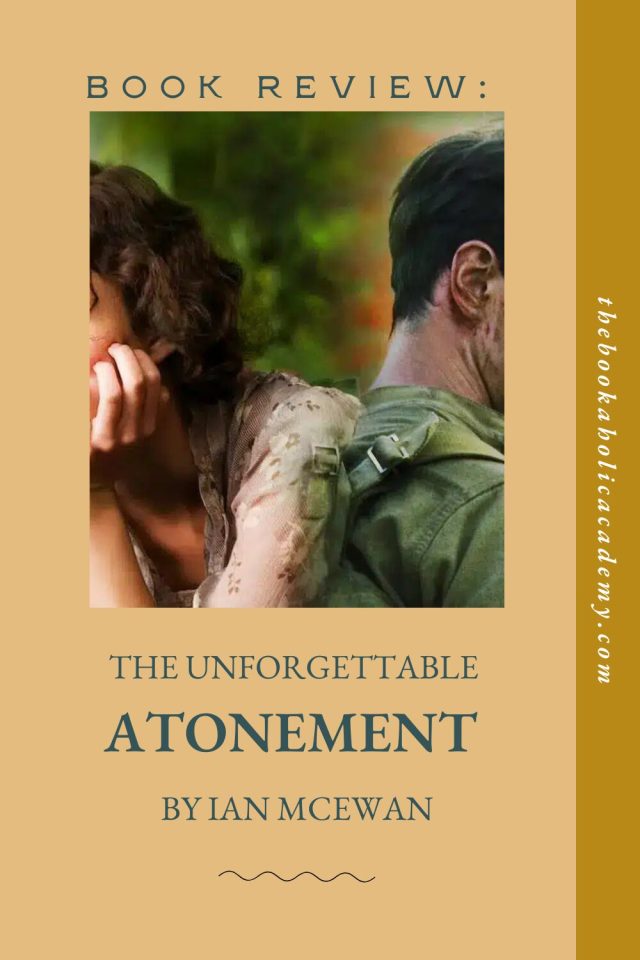Review: The Unforgettable Atonement by Ian McEwan

Disclaimer
This post may contain affiliate links. I will make a small commission if you make a purchase through one of these links, at no extra cost to you. See full disclosure and disclaimer policy HERE.
Some books are just stories, and then there are those that feel like they’ve crawled under your skin and left a mark. Ian McEwan’s Atonement falls into the latter category. It’s not just a novel—it’s a gut punch wrapped in beautiful prose, a story about guilt, love, and the slippery nature of truth. If you’ve ever wondered how one mistake can ripple through lives like a stone thrown into water, this book gives you the answer in heartbreaking detail.
Table of Contents
Plot Overview (Without Spoilers)
At its core, Atonement is about Briony Tallis, a 13-year-old girl with an overactive imagination. One hot summer day in 1935, she witnesses something she doesn’t fully understand. But instead of keeping her confusion to herself, she makes an accusation—one that changes the lives of her sister Cecilia and Cecilia’s lover, Robbie, forever.
From there, McEwan drags us through the brutality of World War II, the fragility of love in a world torn apart, and the crushing weight of regret. The structure is layered, moving from a childhood mistake to its devastating consequences, and finally to the lasting scars left behind.
Themes That Hit Hard
So, what makes Atonement so powerful? It’s not just the story—it’s the themes.
- Guilt and Redemption: Briony spends her entire life trying to atone for her mistake. But can some wrongs ever truly be made right?
- The Nature of Storytelling: McEwan doesn’t just tell a story; he plays with the idea of what storytelling is. Briony is a writer, and her version of events challenges our sense of truth. Do we trust her? Or is reality always a little bit bent by perspective?
- War and Its Aftermath: McEwan doesn’t shy away from the horrors of World War II. The chaos and violence serve as a backdrop for personal tragedy, reminding us that history and human lives are tightly intertwined.
Writing Style
Let’s be real—McEwan’s prose is gorgeous. It’s detailed, sometimes painfully slow in its buildup, but never dull. He lingers on the little things—a glance, a room, a thought—making them feel loaded with meaning. Some readers might find this style a bit heavy, but if you appreciate literary fiction, you’ll likely savour every word.
And then there’s the ending. No spoilers here, but let’s just say McEwan delivers a twist that forces you to rethink everything you just read. It’s one of those endings you close the book on, stare at the ceiling, and mutter: “Wait… what?”
Strengths of the Novel
- Complex, flawed, and realistic characters
- A layered narrative structure that keeps you guessing
- Emotional depth that lingers long after you’ve finished
- A reflection on art, writing, and truth itself
Potential Weaknesses
- Slow pacing at times (especially the beginning)
- Heavy focus on descriptive prose (might not suit readers who want fast action)
- The emotional weight can feel overwhelming if you’re looking for something light
Why You Should Read It
If you’re in the mood for a light beach read, Atonement isn’t it. But if you want a book that challenges you, makes you think, and pulls at your emotions, this one delivers. It’s a love story, a war story, and a story about stories—all rolled into one.
Think of it as literature’s version of a haunting melody: beautiful, unforgettable, and just a little painful to sit with.
Conclusion
Ian McEwan’s Atonement isn’t just a novel—it’s an exploration of how fragile truth can be and how devastating a single lie can become. It forces us to question memory, guilt, and forgiveness, all while weaving a tale that’s as heartbreaking as it is brilliant. Love it or struggle with it, one thing’s for sure: you won’t forget it.
FAQs
Did you like it? Pin this post for later!












